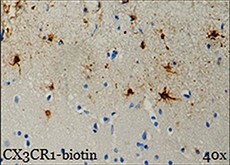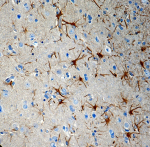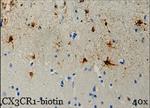- Clone
- 8E10.D9 (See other available formats)
- Regulatory Status
- RUO
- Other Names
- CX3C chemokine receptor 1, fractalkine receptor, beta chemokine receptor-like 1, chemokine (C-C) receptor-like 1, GRP13, V28
- Isotype
- Mouse IgG1, λ
- Ave. Rating
- Submit a Review
- Product Citations
- publications

-

IHC staining of anti-CX3CR1 antibody (clone 8E10.D9) conjugated to biotin on formalin-fixed, paraffin-embedded human Alzheimer disease brain tissue. Following antigen retrieval using Sodium Citrate H.E.I.R., the tissue was incubated with Biotin-conjugated antibody at 20 µg/mL overnight at 4°C. BioLegend's Ultra-Streptavidin (USA) HRP kit was used for detection, followed by hematoxylin counterstaining.
| Cat # | Size | Price | Quantity Check Availability | Save | ||
|---|---|---|---|---|---|---|
| 824004 | 100 µg | 240€ | ||||
CX3C chemokine receptor 1 (CX3CR1) also known as fractalkine receptor or G-protein coupled receptor 13, is a receptor that binds the chemokine CX3CL1. CX3CR1 expression is associated with T cells, NK cells, and brain microglia. CX3CL1 is a unique transmembrane molecule with a CX3C-motif chemokine domain and a mucin-like stalk. CX3CL1 is expressed by activated-endothelial cells, neurons, and astrocytes. The interaction of CX3CR1 and its ligand mediates cell adhesion and migration. CX3CL1 has been reported to play an important role in neuroinflammation and neurodegeneration.
Product DetailsProduct Details
- Verified Reactivity
- Human
- Antibody Type
- Monoclonal
- Host Species
- Mouse
- Immunogen
- This monoclonal antibody was raised against a peptide sequence conjugated to KLH corresponding to amino acids 207-222 of the human CX3CR1 protein.
- Formulation
- Phosphate-buffered solution, pH 7.2, containing 0.09% sodium azide.
- Preparation
- The antibody was purified by affinity chromatography and conjugated with biotin under optimal conditions.
- Concentration
- 0.5 mg/ml
- Storage & Handling
- The antibody solution should be stored undiluted between 2°C and 8°C. Do not freeze.
- Application
-
IHC-P - Quality tested
- Recommended Usage
-
Each lot of this antibody is quality control tested by formalin-fixed paraffin-embedded immunohistochemical staining. For immunohistochemistry, a concentration of 20 µg/ml is suggested. It is recommended that the reagent be titrated for optimal performance for each application.
- Application Notes
-
This antibody is effective in Immunoblotting (WB) and immunohistochemistry (IHC) for the relevant formats of this clone.
- RRID
-
AB_2650684 (BioLegend Cat. No. 824004)
Antigen Details
- Structure
- CX3CR1 is a 355 amino acid G-protein coupled receptor, 7 transmembrane regions protein with a molecular mass of 40 kD.
- Distribution
-
Tissue Distribution: central nervous system, and blood.
Cellular Distribution: plasma membrane. - Function
- CX3CR1 is involved in cell recruitment during inflammation, and participates in cell adhesion and extravasation from blood vessels. It is also known as a coreceptor for HIV1.
- Ligand/Receptor
- CX3CL1 (fractalkine, neurotactin).
- Biology Area
- Cell Biology, Neuroscience, Neuroscience Cell Markers
- Molecular Family
- Cytokine/Chemokine Receptors, GPCR
- Antigen References
-
1. Chen P, et al. 2016. BioMed. Res. Int. 2016. 8090918. PubMed
2. Sheridan GK, Murphy KJ. 2013. Open Biol. 3 (12) 130181. PubMed - Gene ID
- 1524 View all products for this Gene ID
- UniProt
- View information about CX3CR1 on UniProt.org
Related FAQs
- How many biotin molecules are per antibody structure?
- We don't routinely measure the number of biotins with our antibody products but the number of biotin molecules range from 3-6 molecules per antibody.
Other Formats
View All CX3CR1 Reagents Request Custom Conjugation| Description | Clone | Applications |
|---|---|---|
| Purified anti-CX3CR1 | 8E10.D9 | IHC-P |
| Biotin anti-CX3CR1 | 8E10.D9 | IHC-P |
Compare Data Across All Formats
This data display is provided for general comparisons between formats.
Your actual data may vary due to variations in samples, target cells, instruments and their settings, staining conditions, and other factors.
If you need assistance with selecting the best format contact our expert technical support team.
-
Purified anti-CX3CR1

IHC staining of anti-CX3CR1 antibody (clone 8E10.D9) on form... -
Biotin anti-CX3CR1

IHC staining of anti-CX3CR1 antibody (clone 8E10.D9) conjuga...
 Login / Register
Login / Register 









Follow Us